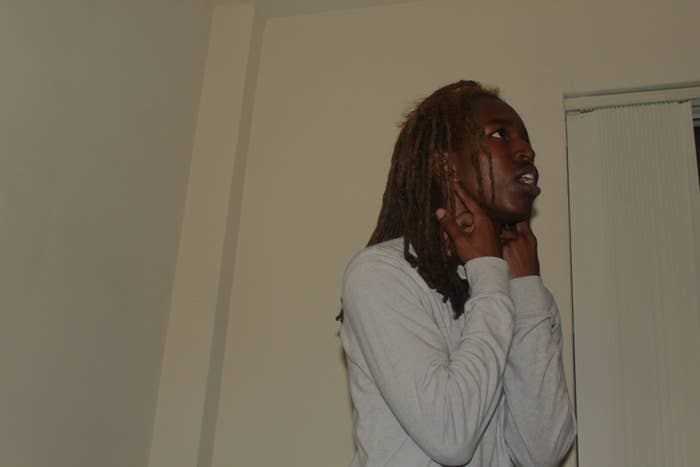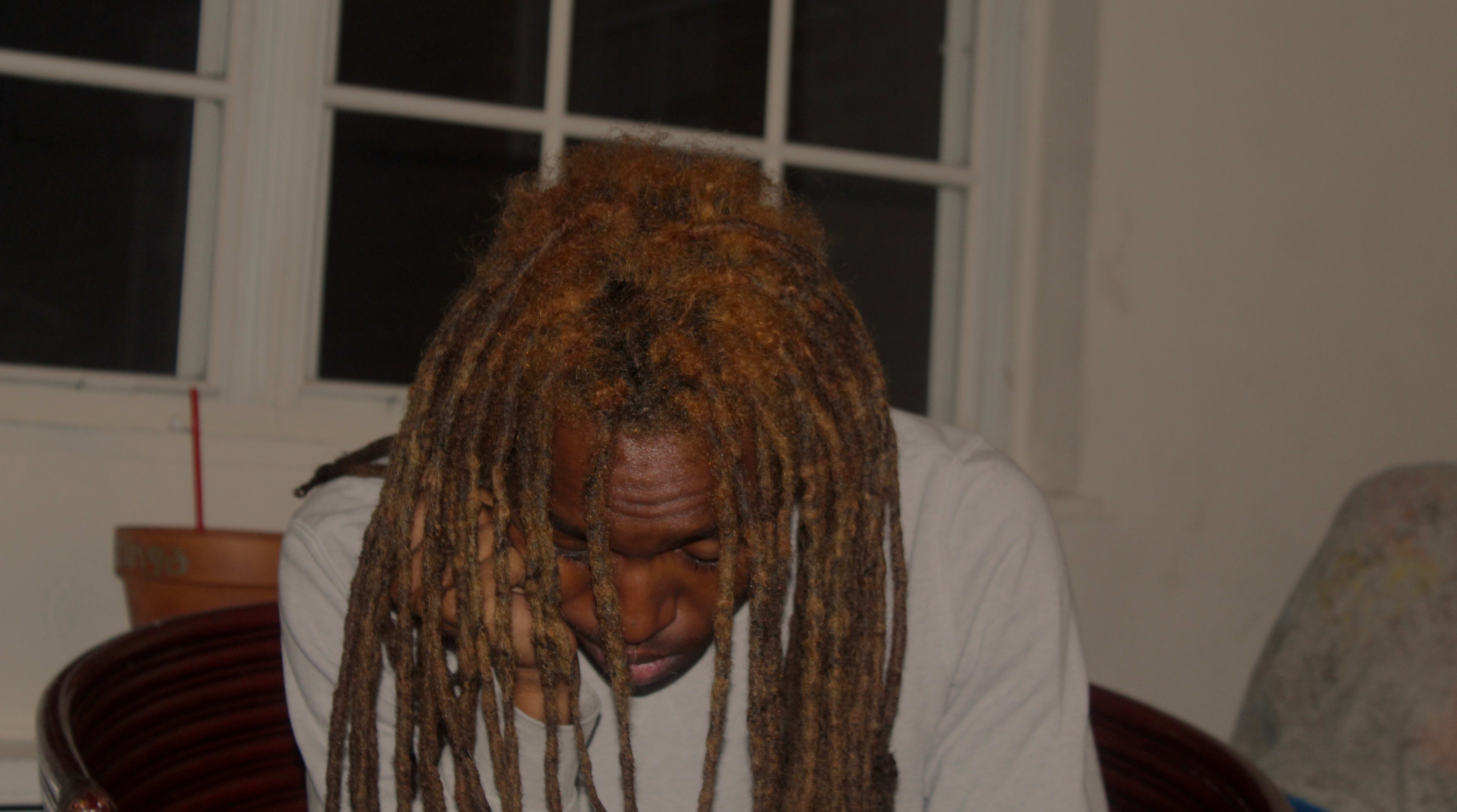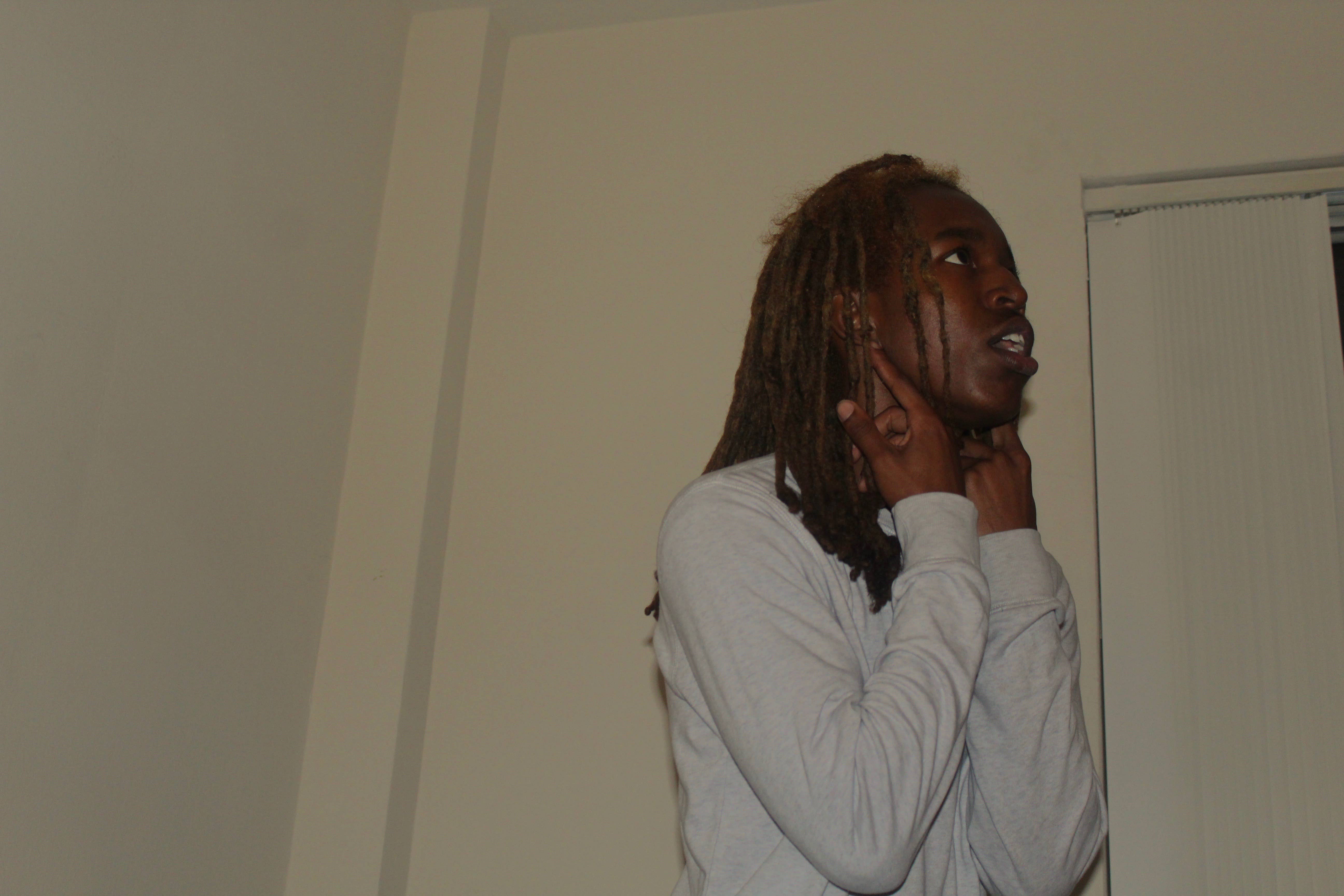
Omavi Minder is a 20-year-old Charlotte native, now a student at Howard University. A biology major, psychology minor, with plans to be a neuroscientist, he describes his most recent semester as “rough, academically.” He reads Nikki Giovanni and Charles Bukowski, and says he should be done in another year “if I’m not a dumbass.” He adds, “I’m a dumbass, though,” before spending the next hour dispelling any such notion.
In fact, MAVI is an exceptional talent, a careful rapper who is part of one of the most exciting forces in contemporary hip-hop, a cadre of artists that includes Noname, Earl Sweatshirt, MIKE, Pink Siifu, and others. I describe it as a special moment in the genre, and he corrects me. “It’s not a moment, it’s a corner. It’s a state, not a time,” he says. “It’s a place that we occupy that’s been occupied before by black artists who carry out this mission.” A mission of love, respect for the art, and liberation. A mission that focuses on community first rather than any single individual.
A dexterous and rich document of self-reflection set to warm beats, Let the Sun Talk is MAVI's breakout release. It arrived in the wake of a medical crisis that crashed his body, leaving him weak and in the hospital—the long-delayed side effect of an appendectomy performed when he was a child. “It was a big battery in my back, being fucked up and how bad it felt to not be able to do shit,” he says. MAVI speaks at a jaunty clip and often revises his thoughts as he goes, striving for precision. These are his plans for the future.
You seem like someone who thinks about writing and rapping as distinct parts, and I’m curious where you write.
I write on the phone, away from the studio. I usually write when I’m moving. Walking and writing is a huge part of my practice. When I go on walks, I’ll come back with a whole verse. The rhythm of walking—there’s a musical term for it, andante—the pace that walking speed establishes, that ambulatory feel, it brings a lot of creativity out of me.
Within the context of the studio, my writing becomes aggregate, shit that’s happened that day or the last few days. But when I’m writing in isolation and I find a song within me, it’s usually something more precise, something more targeted or attached to a singular thing. So the abstractness and the concreteness come at different points in the process, and when I combine them, I can find myself in a cool narrative position.
One thing that I’ve always done when I write prose or poetry is edit and revise, and I’ve begun to do that now [in rap as well]. I didn’t use to see myself as a n***a who needed to go back and fix how I say things. But now I acknowledge that in between the first draft and the release of a song, the growth of the person has to be represented throughout the verse. That also gives a topography to the words, so there’s a peak and a trough, a beginning and rising action and an end.
I’ve been doing this for a little while and I’ve interviewed a lot of rappers, and many guys, even if they do it, would never admit to revising like that. There’s a stigma attached to it, like first thought is always the best thought.
I mean, a lot of times the first thought is the best thought. Here, this how I like to say it: There’s this practice in old jazz called striding style, and sometimes they’ll do it with two pianos, sometimes with two banjos, or sometimes with just two different strings. On one hand, they’re playing a scheduled rhythm or scheduled melody, and on the other hand they’re improvising. Flowing in the improvisational shit is important, because rhythm is ultimately an attraction to a drum that goes beyond words, you know what I’m saying? It goes beyond thoughts. You have to follow that, first and foremost. But I also do like to have my constant melody going because it’ll tie in, and really if you combine the two most skillfully, that’s gonna be the best rapping.
What did you start writing first when you were younger? Stories? Poems?
I was definitely writing hella poems, just about shit I was learning in school that didn’t really make sense. My first poem, like in third grade, involved Abraham Lincoln, about how this n***a did such and such—and such and such. My writing grew out of an urge to coalesce contradiction in words, and draw together opposite sides of the spectrum. Despair and joy, and finding the small smiles within life. We all do things that go against each other sometimes, and in the contrast you can pull out really beautiful art.
Which poets were you reading?
A lot of Nikki Giovanni, bro. Nikki Giovanni is fucking fire. And into adulthood I got into Bukowski heavily. He really put a magnifying glass on the soap scum on the side of n***as’ showers. He’s able to pick out the minute shared human experiences that really call into focus how we process our lives. They’re small and obscene moments, and they’re usually tucked under a rug—he pulls the curtain back on all that shit. That’s what I admire about his writing. I try to be reflective as he is about my life.
How do you find yourself thinking about the uglier side of Bukowski’s work, with regards to women?
I read his book Women, which is basically an anthology of who he fucked and how he fucked it up. Man, that shit is thoroughly interesting. The private sexual matters of masculinity don’t really be discussed—how we be moving sometimes is just for us and us only to note. But for him to write about that shit? First, I feel like this n***a Charles Bukowski is a horrible n***a to women, period. But he’s also a white man, so it’s not like I idolize this n***a to begin with. You know what I’m saying?
It seems like a good thing to balance out Bukowski consumption with Nikki Giovanni.
But some things that Nikki Giovanni say are calls to arms and are militaristic, [and] that might seem immoral to some people. I can’t really get caught up in how motherfuckers feel toward the art I consume, because I consume it for the same reason I would eat a carrot. I don’t have no feelings toward the carotenoids in the carrot or towards my eye health—I just wanna eat a carrot. You need variety in your diet.

A rap song is not written in English to me—not like the English I could speak in a classroom or the English I’m speaking to you right now.
How do you translate what you write to rap music?
I never convert prose to song. I don’t think that’s something that should be done. A rap song is not written in English to me—not like the English I could speak in a classroom or the English I’m speaking to you right now. Even though my flow is prosaic in that it has coherent sentences that flow from one idea to the next, it’s not not poetry. Printed poetry is the use of the page as a medium to design a shape and feel for the words. And that’s what I do with a beat. A lot of times the first step on the beat is decided by the beat. I love jazz shit, funk shit, gospel. I love marching band elements in a beat, big band elements. Sometimes when I get a guitar or a horn, I want to talk shit. But if I hear a strong piano, it’s gonna send me in a different direction. Or a vocal sample might send me down another path. It’s about finding shit that’s comfortable to my ear and that has musical elements to drive me in a thematic direction.
Are there particular producers you have a strong collaborative relationship with?
Ovrkast makes some of my favorite beats. Ntvrme he makes very good beats, as far as making shit that is made for MAVI to wrestle to the ground. Nephew Hesh, who made “Self Love” and “Guernica,” two of my favorite beats of all time. A lot of the collaborative relationships that are newer I’m trying to set time aside to build because I think that requires in-person hours. There’s been consistent barriers, but we starting to overcome that shit. I think I’m finna move, bro. I think I’m finna move to L.A. for a little bit.
After you finish school?
Nah. Right now. I might take classes online and chill for a semester and finish my album. Always giving 70 percent to one and the other fucks up your ability to do either. I feel like it’s a lotta non-musical, non-financial and non-academic factors in DC that’s keeping me from doing my best work there. And so I gotta fix that shit.
Do you feel pressure from anyone in your life to finish school rather than focus on music?
Hell no. I said to my mama, “I think I’m finna move to LA for six months—how you feel about that?” And she said, “It sound good to me.” My folks, bro, they gonna step behind me. I been showing this to my family and friends for over a year now, what this shit is and what it’s gon’ be. So when I say "I’m finna do this and this is gonna happen," I didn’t cap. It might have took a little bit more time than what I said, but I guaranteed it to myself. And establishing that confidence and that trust with the people you care about is important. I don’t do much of this shit for myself, if any. I do it for everybody, bro.
If you move to LA, it’ll put you in close proximity with the music industry. Last interview I read with you, you were still without management or a label—could that change in L.A.?
I’ll definitely explore other avenues, but only on my terms. On terms that support myself and family’s lifestyle sustainably. Getting a little bit of money to pay back a little bit of money to have a little bit more money—I have zero interest in that shit. The day n****s see me on some regular industry shit, you gonna know I made a lot more money than what I made before. Otherwise, I don’t see no real game in it. I own the means of production right now. Everything that you’ve seen, output-wise, was a product of some shit I made, some shit I recorded, or an email I sent asking one person to do one task that I outsourced and then integrated into the full scope of this shit. It’s damn near like collage making. It’s a lonesome process, and because of that a lot of the skill set that they gonna sell you with these weirdo deals...I don’t really see a financial mandate for taking out a loan on that shit. These little 50-, 80-rack [deals]—I can’t get no house with that. I done did this shit without a house the whole rest of the time—for zero dollars.
Is that how you think about entering into a record deal, as taking out a loan with some label?
I think that’s literally what it is, unless I got it confused. Unless there’s some misunderstanding.
Not everyone would conceive of it that way.
Well. [Laughs] It’s not funny that they don’t see that.
What does healthy success look like for you?
It looks like establishing legal support, food supply and subsidized transport directly to the black community. It means the funneling of weapons in and out of the black community with better education around gun control, and education and black history in general, outside of the context of a national education system. It looks like a network of community centers for arts and sciences for black kids to be able to travel from city to city and learn from each other. This mission is a big big big thing.
It’s interesting that when I asked about your success you immediately took it to a macro perspective. It doesn’t seem like you think about yourself outside of community. Is that fair?
Yeah! Because I eat pretty much every day, but everybody don’t. Once that happens, then we can talk about a Rolls Royce and shit.
What do you need to get better at to achieve your goals?
Organization. Communication. Patience. Appetite.
One of my favorite lyrics on the new project is “I done got some crazy ass results by showing kindness.”
Real deal, bro. Any n***a in my life will vouch.
Was there a period in your life when you weren’t kind?
Nah. I ain’t never been no hoe like that. You don’t wanna harden your heart bro, because your heart is not for the people who are gonna harm you in the first place. Your heart is for the people who are gonna protect it. I try and keep my shit as warm as possible.

I used to look at death as an escape or the climax of life, but death come way after the final call to action is made and the mission is complete. I’ma die of old age with a smile on my face.
Why do you have “hard to kill” tattooed on your chest?
Because I am. I been finna go out a few times over the last four years—and before that, as a baby and as a little boy I been finna go out a few times. It ain’t took me yet because I got shit to do. I used to look at death as an escape or the climax of life, but death come way after the final call to action is made and the mission is complete. I’ma die of old age with a smile on my face. I used to want to crash and burn out, because I thought that shit was cool. But we very hard to kill and we gonna go out with a big amount of mileage on the odometer. Real deal.
Have you dealt with health issues?
Yeah. When I was a little kid, My appendix ruptured and was leaking toxins in my body and I had to have it removed in an emergency appendectomy. Because that was a traumatic surgery that I had real young, when I was growing scar tissue developed around where they made the incision. So last year one night I just threw up my all food. I continued to eat and continued to throw up all my food. And this is nasty, but I wasn’t shitting or farting at all. Eat, throw up. Eat, throw up. Nothing was going down. And basically what had happened was the scar tissue had formed tight bands around my intestines and it was gonna cause a total digestive shutdown pretty soon if we didn’t get that surgery done. So I went into the hospital in October, got the surgery, and then me and my mama we drove back to Charlotte and I recorded “bedrest.” It was a big battery in my back, being fucked up and how bad it felt to not be able to do shit. “Bedrest” is where Let the Sun Talk begins. That run of singles across SoundCloud and YouTube plays like an album.
You have that line on “Ghost (In the Shell)”: “Fluid eight days and nights, my stomach a cave.”
Yeah. I dropped like 20 pounds.
Did it make you feel invincible in some way?
Hell no, n***a, I’m black still. [Laughs]


